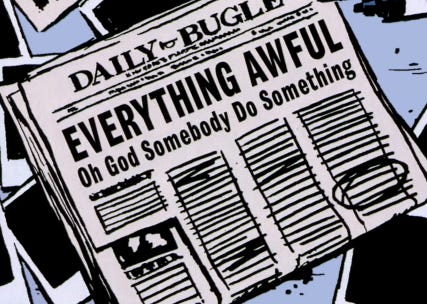So What, Who Cares (vol 2, issue 35) Why sustainable seafood may become a rare treat
Hello! My preschooler has informed me that we are experiencing Daylight Sunlight Time, a label I applaud for its rejection of the fiction that this scheduling move saves us anything.
Tonight's big news: I have finally set up a Pinterest board featuring all of the books and most of the videos and TV shows mentioned in previous 105 issues of So What, Who Cares? In the case of the books, I do link to an Amazon.com page, but as I do not have any sort of Amazon affiliate set up, I assure you: I am not making any money off anything you buy.
Each individual pin also has a link back to the issue of SWWC in which the item was featured. So if you're looking for a one-stop web page with recommended reads or other ways to enjoyably feed your brain, have at it. Full credit for this idea goes to @tahleen -- thanks again for helping me solve this problem!
*

It's going to be a bad year for the seafood industry in the western U.S. The sardine season is likely to be canceled, thanks to the near-total collapse of the Pacific sardine population. This collapse isn't a surprise -- scientists began sounding an alarm about it three years ago -- but it will affect a tremendous number of species, some of which are listed in the infographic to the left (a larger version is here).
But the sardine collapse isn't the only challenge west coast fishers face: a so-called warm "blob" of water that's spreading down from the Gulf of Alaska has pushed ocean temperatures up 3.6 to 5.4 degrees (F) above average. These higher temperatures have been fingered in die-offs among Cassin's auklets and California sea lion pups; Fraser River sockeye salmon have fled to where commercial fishers can't reach them; scientists are also expecting shrimp yields to plunge, since shrimp are historically vulnerable to higher water temperatures.

Remember: this is all happening in addition to the drought-related Chinook salmon die-off in California (vol 2, issue 18).
So what? These events demonstrate that smart fishing stewardship is both proactive ("Let's not kill dolphins because we want tuna!") and reactive. Fisherpeople cannot control the temperature of the water or the rainfall in California; they can only react to conditions that are threatening their stock. These events also demonstrate that West Coasters are going to have to rethink the definition of local seafood as one-time staples dwindle.
Who cares? Other than the giant, migratory mammals who are wondering where their food went? Commercial fisherpeople up and down the west coast are going to have to react to conditions that are largely out of their control (see a lovely photoessay on anchovy fishing in the San Francisco Bay here), and that means prices are going to fluctuate for consumers who strive to buy sustainable seafood.
On the other hand, overseas commercial fishing operations can step in to meet the demand for cheap seafood. (Just be warned: there's a not-insignificant chance the seafood's cheap because it's being caught and processed by slave labor.)
*

Men complain more than women about work-life issues. In 2008, 60% percent of working fathers reported a work-family conflict compared to 47% of working mothers, according to the White House's Economic Report of the President. What is notable about this? Back in 1977, only 35% of working fathers reported a work-family conflict compared to 41% of working mothers. Pressure has risen sharply for me, while women's pressure crept up only slightly.
A different source, the Pew Research Center, flips the script: 56% of working mothers say it's somewhat/very difficult to balance work and parenting, edging out the 50% of fathers who report the same feelings.
So what? Two different sources show a significant percent of working fathers grappling with Having It All. This is another sign that as men step up to do more housework and childcare at home, they're feeling more pressure overall. (Men have gone from doing four hours of housework per week in 1965 to 10 hours per week in 2011.)
Another facet of the problem was pegged by Beth Humberd, a co-author on a working-fathers study in Journal of Business and Psychology. She notes:
“When women become mothers,” she noted, “a lot changes for them on the work front, and perhaps too much” — they can be passed over for promotions or big assignments. “Yet when men become fathers, little seems to change in terms of others’ expectations.”
“They’re still rewarded and expected to be ideal workers,” she said, “and it has trickle-down effects on their spouses. It leaves men largely unable to adapt their work demands in order to meet family needs.”
So men are often faced with little to no flexibility on the job (or tremendous stigma in taking paternity leave, despite clearly-documented societal and corporate benefits for doing so) while also facing tremendous change at home.
Who cares? Moms Rising, which might want to consider changing their name to Families Rising? (I am only half-kidding: Men are lobbying to change the name of Amazon Mom to Amazon Family, noting that Amazon has no problem calling their discount-purchase program Amazon Family in non-U.S. countries.)
Seriously, the people who should care about this news are people who are invested in changing corporate culture from the inside (because studies show people who aren't distracted by familial pressures do better work) and people who are going to make a lot of money taking on workplace discrimination cases from male parents who are harassed, unfairly compensated or daddy-tracked at work.
This is not a trend: Working parents are not becoming less engaged with their children. They are spending more time than prior generations. And this development is going to hit companies in the wallet.
As reported in vol 2, issue 31:
Workers are not hesitating to make work-life balance a priority (vol 1, issue 41), and employers are responding to that (vol 1, issue 33). Second, it shows that parental leave is becoming less of a gendered perk as more men step up and shake off the stigma of paternal leave (vol 1, issue 4; vol 2, issue 21).
The employers who insist on clinging to a corporate culture where flexibility, leave and balance are not incorporated will be the ones who lose out on talent -- or they'll be the ones notable for high operational costs as they churn through workers and lower productivity as the folks who are left struggle to balance work and family responsibilities.
Related reading: The resignation letter from Google's CFO, Patrick Pichette, has been making the rounds. He's unusually forthright in assessing the challenges in giving 100% to a fulfilling-yet-demanding career while also trying to give the best of yourself to the people you love. And he is refreshingly blunt about having the privilege to resign:
In the end, life is wonderful, but nonetheless a series of trade offs, especially between business/professional endeavours and family/community. And thankfully, I feel I’m at a point in my life where I no longer have to have to make such tough choices anymore.
*

Today in pop culture bracketology: I would be remiss if I didn't point you all to Marx Madness. Sixty-four communists enter, and will be gradually winnowed to the Round of 32, the Sweet Socialist Sixteen, the Egalitarian Eight and then the Gang of Four. Those of you who studied social sciences or communication in school are going to crush this when filling out your brackets. (I feel for postmodernist students, though: Bakhtin's up against Lenin in the first round.)
And for an extra laugh, be sure to visit the MeFi post about this bracket, because the comments are sharp and funny.
*
Did you miss an issue of So What, Who Cares? The archive is here. Are there typos? I apologize in advance.
As always, I welcome your feedback and suggestions via email or Twitter. Always let me know what you think about So What, Who Cares? If you really like it, tell a friend to subscribe.


